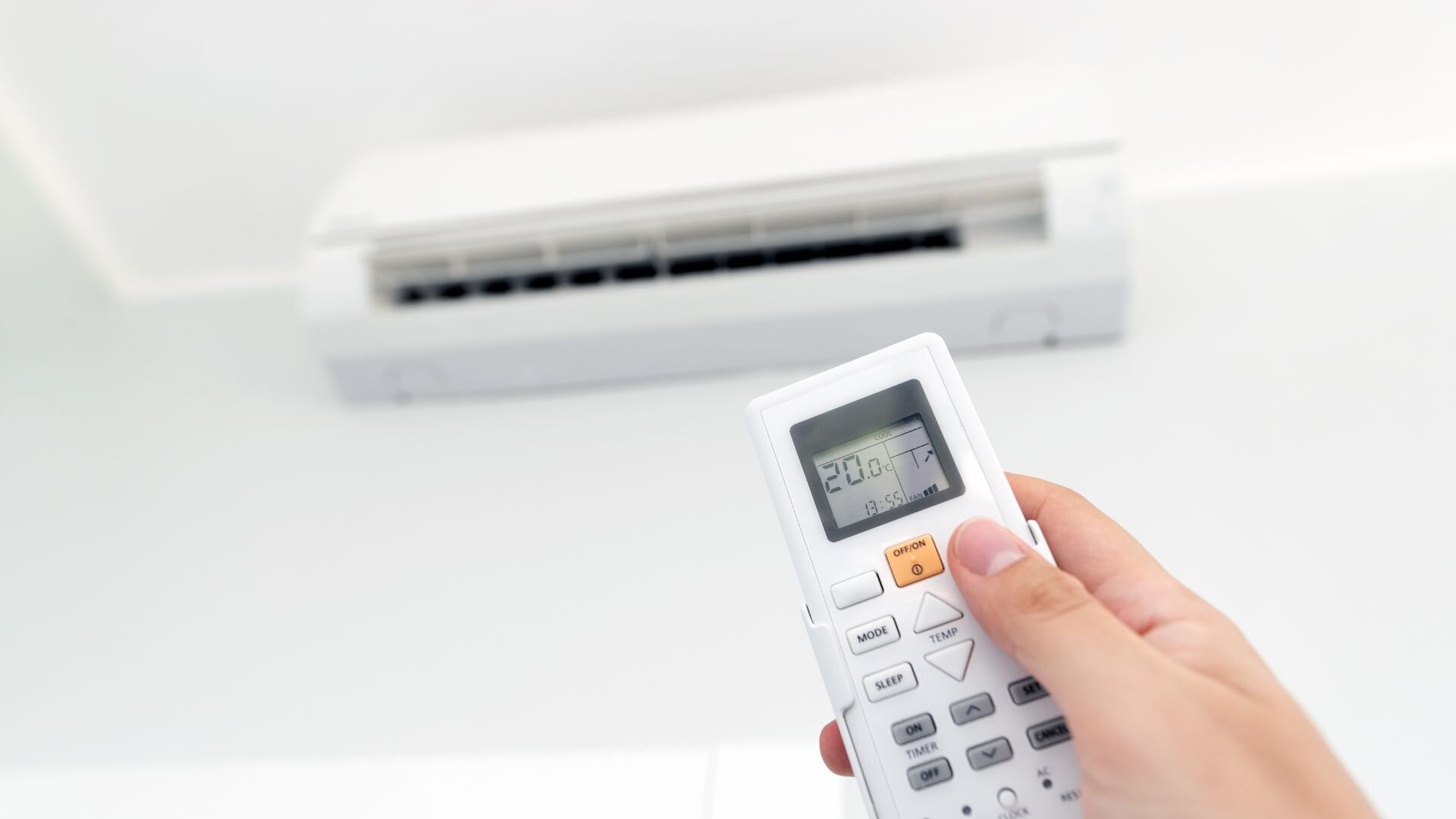
When summer rolls around, having a working air conditioning unit becomes more than just a luxury—it’s essential. If your AC fan isn’t up to scratch, it can really throw off your comfort, productivity, and even how well you sleep. Spotting potential issues early could mean the difference between a simple fix or an expensive headache later.
Air conditioning systems are complex, and the fan is a crucial component that ensures the efficient circulation of cool air throughout your space. Learn more about benefits of ducted air conditioning systems. When this element encounters issues, it can manifest in several ways, from strange noises to a complete lack of airflow. Understanding these symptoms is the first step in troubleshooting your AC unit.
If you’ve got the right know-how and tools, you can fix some AC fan issues yourself. But it’s vital to recognize when to call in the experts. Overstepping could lead to more damage or personal injury, things you definitely want to avoid.
Regular maintenance is key to prolonging the life of your AC fan and ensuring it runs smoothly. This guide empowers homeowners with expert tips, practical solutions, and maintenance advice to tackle common AC fan problems.
Identifying AC Fan Problems
A well-functioning air conditioning (AC) system is vital for comfort, especially in the heat of the Gold Coast. The fan in an AC unit plays a critical role in the circulation of cool air. When it malfunctions, it’s imperative to identify the problem swiftly to prevent further issues. Here are common symptoms that might indicate your AC fan is experiencing difficulties:
1. Unusual Noises: A healthy AC unit operates with a consistent, low-level sound. If you start hearing grinding, squealing, or rattling noises, it indicates that the fan or its components may be damaged or obstructed.
2. Failure to Start: If your AC fan doesn’t start, it could be due to electrical issues, a faulty motor, or a tripped breaker. This requires immediate attention to prevent damage to the compressor.
3. Weak Airflow: When the fan is running, but the airflow is weaker than usual, the culprit could be a dirty filter, blocked vents, or an issue with the fan blades.
4. Overheating: AC units are designed to shut off if the system overheats. If you notice the AC shutting down intermittently, the fan motor could be overheating and automatically turning off to prevent damage.
5. Ice Buildup: Ice on your AC unit, especially around the coils, can indicate a problem with the fan’s operation, as it may not be circulating air properly.
6. Thermostat Problems: Sometimes, the issue may not be with the fan but the thermostat. If the fan isn’t receiving the correct signals from the thermostat, it won’t operate correctly.
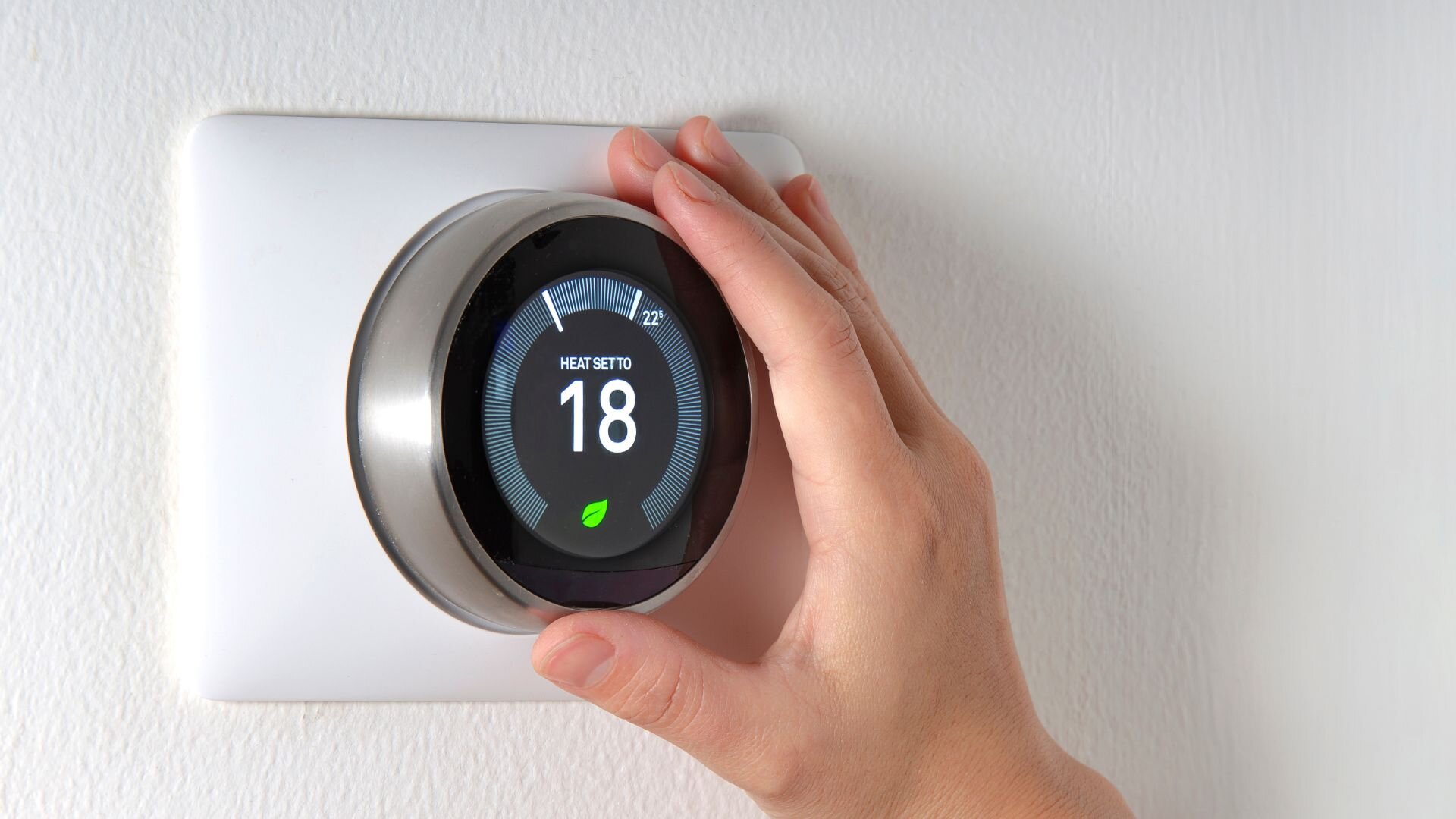
Each symptom can point to different issues within the fan system, some of which can be resolved with basic maintenance, while others might require professional intervention. It’s crucial to approach these problems cautiously and consider safety first, especially when dealing with electrical components. If you’re unsure, it’s always best to consult with a licensed electrician who can diagnose the problem accurately and provide safe, effective solutions.
DIY AC Fan Solutions
Running into AC fan problems isn’t unusual. Before ringing up the pros, there are a few straightforward steps you can try to troubleshoot and possibly fix the issue yourself:
1. Check the Thermostat: Ensure your thermostat is set to ‘cool’ and the temperature is low enough to trigger the AC unit to turn on. Sometimes, a simple adjustment is all that’s needed.
2. Inspect the Circuit Breakers: A tripped circuit breaker is a frequent cause of AC fan failure. Locate your electrical panel and check if the breaker for the AC unit has tripped. If so, flip it back on and check if the fan starts.
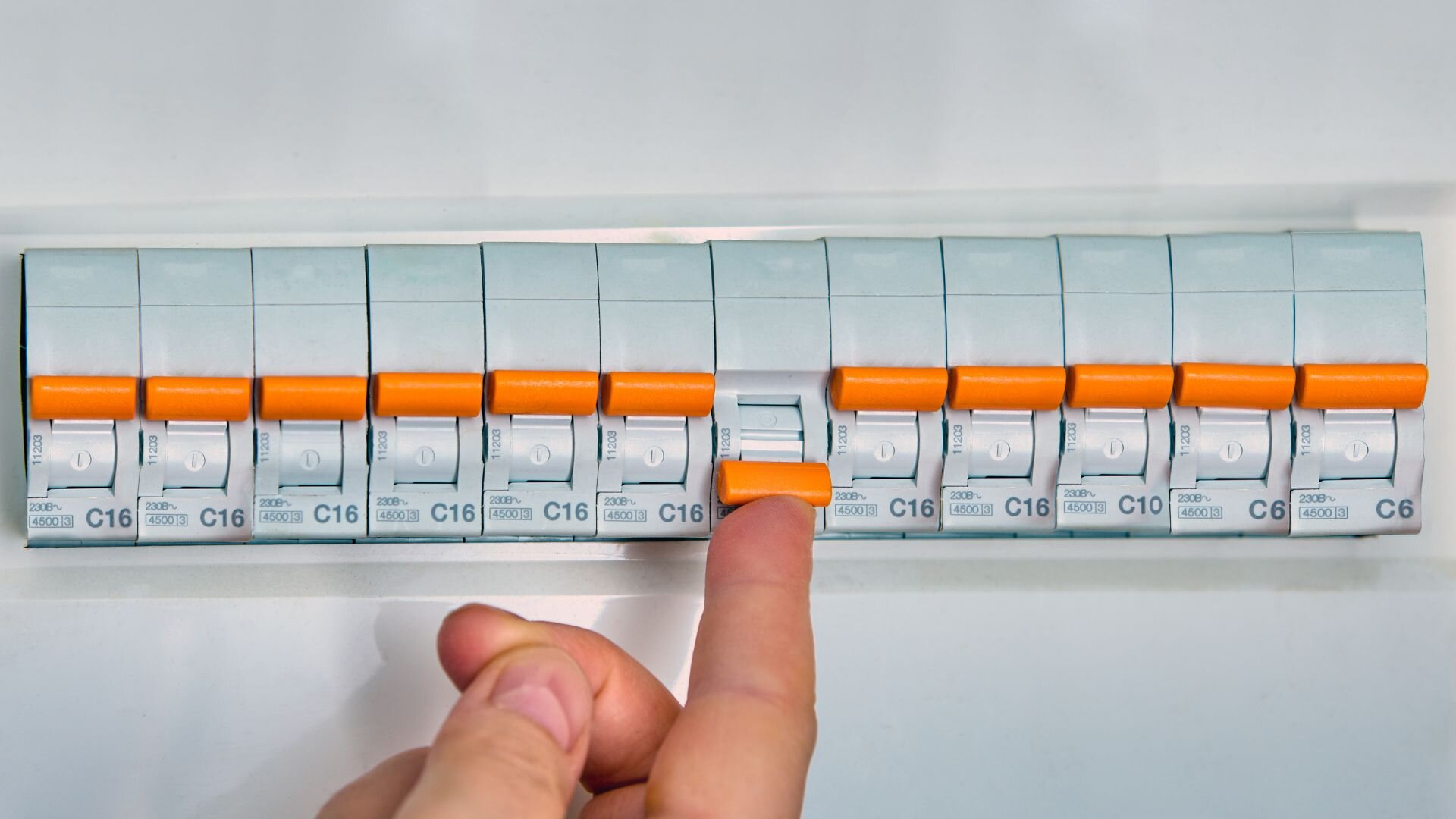
3. Examine the Air Filters: Dirty or clogged air filters can obstruct airflow and strain the fan. Check your filters; if they’re dirty, replace them with new ones to see if this improves the fan’s functionality.
4. Clean the Condenser Coils: Dirt and debris can inhibit the performance of the condenser coils. Gently cleaning the coils can sometimes improve the operation of your AC unit. Make sure to turn off the power to your AC before attempting this.
5. Check the Fan Blades: Turn off the unit’s power and inspect the fan blades for any signs of damage or obstruction. If the blades are dirty, gently clean them. If they’re bent or damaged, they may need to be replaced.
6. Test the Capacitor: The capacitor starts the fan motor and keeps it running. If your AC fan isn’t starting, a faulty capacitor might be the problem. Capacitors store a high voltage charge and can be dangerous, so this is a step best left to professionals unless you have experience.
7. Lubricate the Motor: Some AC fan motors require regular lubrication. If yours is one of them, and it’s making noise or seems to be struggling, it might need lubrication. Consult your owner’s manual for the correct procedure and type of oil to use.
8. Reset the Unit: Some AC units have a reset button to help clear any electronic glitches. Locate the button on the outside unit and press it according to the manufacturer’s instructions.
While these steps can help resolve minor issues, they come with caution. Never attempt any repairs you are uncomfortable with, especially when it involves electrical components. If the problem seems complex or if you’re unsure at any stage, it’s time to call a professional. Electrical work can be hazardous and is often best left to the experienced hands of a licensed electrician.
Professional AC Fan Repairs
When your efforts to fix your AC fan fall short or you encounter a problem that surpasses your DIY capabilities, it’s prudent to enlist the help of professional technicians. Opting for professional AC fan repairs means submitting your unit to a meticulous diagnostic process by certified experts. These technicians bring specialised tools and a depth of knowledge to the table, thoroughly examining your AC unit’s electrical connections, motor function, belts, bearings, and capacitors to pinpoint the issue’s root.
Repairing an AC fan is delicate, often involving high-voltage electrical components and hazardous refrigerants. Professionals are equipped with the appropriate safety gear and trained to mitigate risks to ensure a safe repair or part replacement. If parts need to be replaced, these specialists provide access to premium, OEM or equivalent components, enhancing the reliability and extending the lifespan of your AC unit.
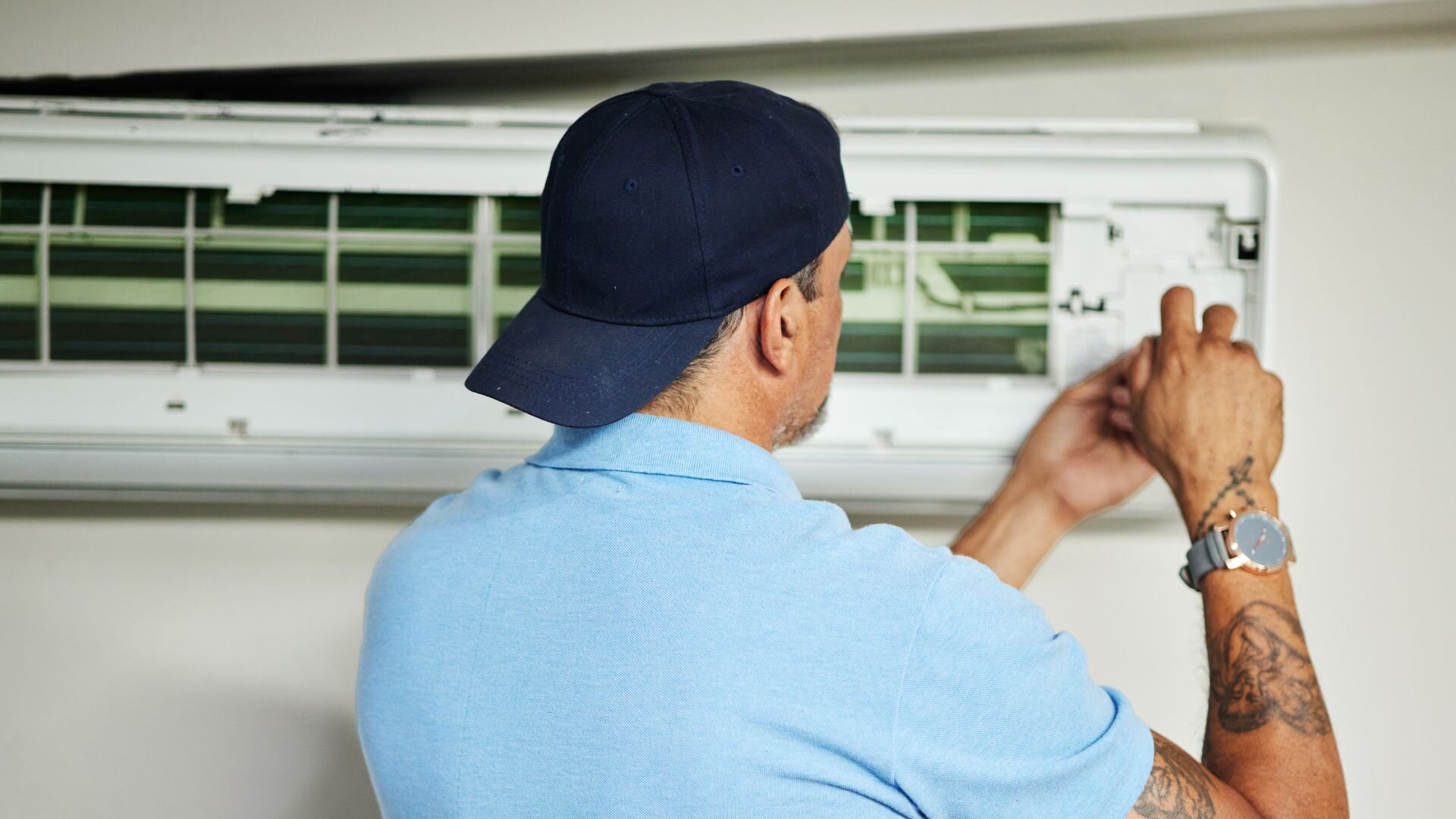
One key benefit of hiring a professional service is the assurance provided by warranties and guarantees on the work performed and parts used. This assurance is invaluable, offering peace of mind and ensuring that any persistent issues will be addressed without additional cost. Professional technicians execute repairs more efficiently than the average DIY enthusiast and are adept at identifying and remedying potential problems, often before they escalate.
Following a repair, professionals impart maintenance tips that can be crucial in averting future complications, contributing to the prolonged health of your AC fan and related components. While the upfront cost of professional services might appear steep compared to DIY fixes, the long-term savings can be substantial. Professionals can avert further damage, maintaining the efficiency of your AC system and keeping energy costs down.
For top-notch service, make sure to choose a well-respected, certified technician or HVAC company. Check reviews, ask for references, and confirm licenses and insurance—doing your homework pays off. With professional AC fan repairs, your unit is more likely to run smoothly, ensuring you stay cool during the hottest Gold Coast summer days.
AC Maintenance Tips
Maintaining your AC unit is vital for ensuring it runs efficiently and lasts as long as possible. Regular maintenance helps prevent unexpected breakdowns and keeps your energy bills in check. Here are several tips for keeping your AC in top shape.
Start with the filters, the first line of defence in maintaining indoor air quality and keeping your system clean. They should be checked monthly and replaced or cleaned, especially during peak usage. A clean filter can significantly improve the performance of your AC unit.
The area around the outdoor unit requires attention, too. Ensure no debris, such as leaves or branches, is blocking the airflow. A clear zone of about two feet around the unit is also advisable. This ensures optimal performance and easy access for maintenance or repairs.
Condenser coils can get dirty over time, which makes your unit work harder and less efficiently. Giving them a clean each year is a great idea. But since it involves handling the unit’s insides and maybe dealing with refrigerants, you might want to leave it to a professional.
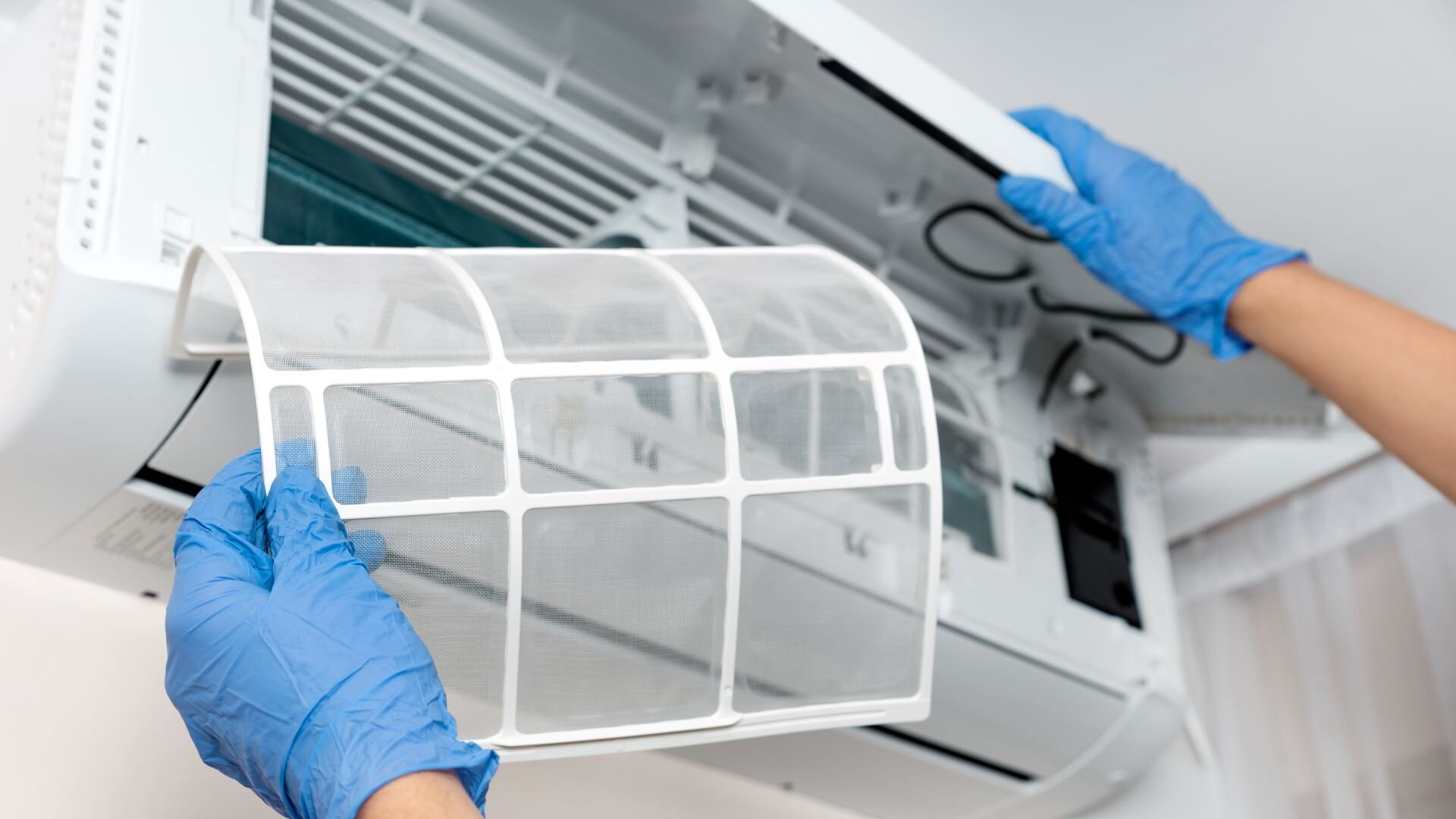
It’s important to check the coolant lines regularly. These insulated pipes run from the evaporator on the air handler to the condenser outside. If the insulation is fraying or missing, replace it to ensure maximum efficiency.
Another aspect often overlooked is the thermostat. Upgrading to a programmable thermostat can lead to better energy management, allowing you to set temperatures according to your schedule. This way, you’re not cooling an empty house, which can lead to significant savings.
Schedule an annual tune-up with a professional. This proactive inspection can identify issues before they become costly repairs. This service typically includes checking the system’s refrigerant levels, testing for leaks, measuring airflow through the evaporator coil, inspecting the electronic control sequence, and ensuring that heating and cooling systems cannot operate simultaneously.
Lastly, listen to your AC. Unusual sounds or a change in the noise it makes can be the first sign that something isn’t right. Addressing these sounds early can prevent minor issues from becoming big problems.
By following these maintenance tips, you can extend the life of your AC unit, save money on energy costs, and enjoy a comfortable indoor environment throughout the year.
Contacting the Experts
When it comes to AC maintenance and repair complexities, sometimes the best course of action is to consult with the experts. Professional expertise is invaluable whether you’re facing persistent issues that DIY efforts can’t resolve or simply looking to keep your system running at peak efficiency.
If you’re on the Gold Coast and need reliable AC services, don’t hesitate to contact the seasoned professionals at Enersol Electrical. Our team is equipped with the latest tools and a wealth of experience to tackle any AC challenges you may face. We pride ourselves on transparent pricing and a commitment to customer satisfaction.
Don’t let AC issues have you sweating in summer or freezing in winter. Get in touch with us today to book a service appointment or find out more about our maintenance plans—perfect for keeping your system running smoothly all year. Remember, regular maintenance is a smart investment in your home’s comfort and your air conditioning’s longevity.